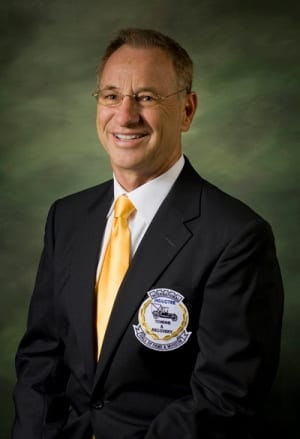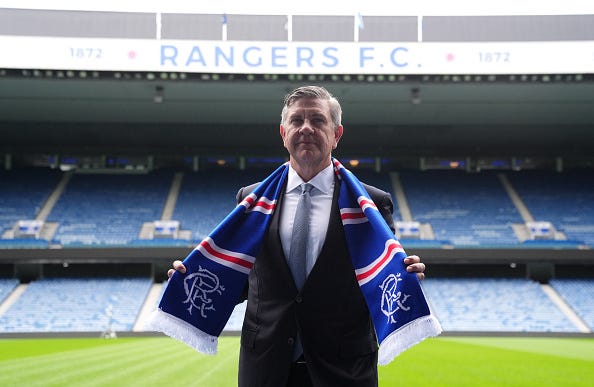🇺🇸 AMERICAN OWNERS #1: 🗣️"Bill Miller would've been great at Ibrox… he'd have won over the fans"
Rangers are the latest of six Premiership clubs to be fully or part-owned by Americans. Did they miss a trick back in 2012?
Award-winning sportswriter Stephen McGowan continues his monthly investigations series by considering the impact of American ownership on Scottish clubs. In the coming season, half of the 12 teams in the SPFL Premiership will be fully or partially owned by Stateside investors, not least Rangers, whose fans have warmed to the idea having soundly rejected Tennessee truck tycoon Bill Miller’s advances in 2012.
🗣️ Tomorrow: Part II — We hear from relegated St Johnstone owner Adam Webb and promoted Livingston owner Calvin Ford on their motivations for getting involved and their plans for the future at their respective clubs.
🗣️ Friday: Part III — Lachlan Cameron speaks about his at times challenging tenure at Ayr United, and how we haven’t seen the last of American investment in the Scottish game.
Parts II and III are for paid subscribers only.
Been waiting for right moment to support our indie journalism? This is it…
By Stephen McGowan
Rangers are the latest Scottish Premiership club to fall into the hands of American owners. History shows that they might have been the first.
In the coming season, half of the 12 teams in the SPFL Premiership will benefit from the investment of owners or significant shareholders from the United States.
When Tennessee truck tycoon Bill Miller was one of four potential buyers for the assets of oldco Rangers in May 2012 there were none.
And, despite putting £11.2million on the table, supporters harboured serious reservations over the idea of an American owner.
The Ibrox side played Dundee United in a league game and two banners appeared in the stands reading: “Truck off Miller — Yanks no thanks”. The other said: “No thanks to asset-stripping Yanks”.

Around that time, England’s biggest football clubs were becoming more receptive to the seductive cheque books of owners from the other side of the Atlantic.
Manchester United had fallen under the control of the Glazer family while Liverpool were part of John Henry’s Fenway Sports Group.
In Glasgow, where football clubs were traditionally owned by local lawyers, accountants, steel magnates or used car salesmen, the message to Miller was unambiguous. As well as banners, the businessman also received vitriolic emails and withdrew his offer for the club, citing lingering concerns over its perilous financial state and public hostility to his plans.
Jon Pritchett, the former chief executive of Club Nine Sports was Miller’s advisor at the time. He tells Nutmeg FC: “Bill was most definitely the real deal. At the time of the plan to acquire Rangers, I estimate he was worth about $750m. I don’t know, but he may even be a billionaire now. What he did to build and manage Miller Industries into the global leader in the towing industry should be taught at Harvard. He’s wickedly smart.”
None of this cut much ice at a time when American owners in British football were regarded with suspicion and mistrust. Viewed as another opportunistic asset stripper with little or no understanding of what Rangers were all about, Miller took the hint.
“It was intense for sure,” Pritchett recalls, “but that’s why you would be interested in a club like Rangers.
“It’s one of the winningest clubs in all of sports and the fan base is large and deeply invested. I think it may have given him some pause, but Bill wasn’t afraid of that. He would have won them over in time. I’m sure of that.
“Bill and I have talked many times since then. While I think he would have ultimately been successful, I think it would have taken up way more time and money than he wanted to get Rangers back to producing winning football.”
It took 13 years, but Rangers got there in the end. Last month, one of Scotland’s biggest sporting institutions was sold to a consortium led by Andrew Cavenagh and the 49ers investment group for an estimated figure of £75m. After a decade of boardroom flux and on-field failure frustrated supporters were happy — this time — to roll out the red carpet.
Across the board, reservations over American owners have softened. Not least on the board of the SFA, where rules governing multi-club ownership — a popular model in the United States — were relaxed significantly. A change in the Rangers support, meanwhile, reflects a weariness with playing second fiddle to Celtic and an acceptance that fears of private equity sharks milking the game dry while pushing to scrap relegation and move fixtures to New York or LA have been overblown.
Bill thinks long and hard before he acts, but he plays to win
It’s futile to speculate on what difference a sale to Miller might have made back in 2012. Or how different Scottish football’s landscape might look if Rangers had been the first, and not the latest, to follow the trend for American owners. Pritchett can’t shake the feeling that they missed a trick.
“Bill thinks long and hard before he acts, but he plays to win. He’s been incredibly successful at lots of investments and business endeavours. His business acumen and his wealth would have made him a great owner in Scottish football.”
He’d have been one of many by now. American investors finally closed a deal for a Scottish club a year later when Texans John Nelms and Tim Keyes took control at Dundee. In the period since, the trickle has turned to flood.
Mark Ogren purchased Dundee United, the club 200 yards down the street. So far, his personal investment runs to more than £13m.
The late Ron Gordon purchased Hibernian in 2019 before his widow and son sold a 29.9% stake to Bill Foley, the Las Vegas-based owner of Bournemouth. Hibs are now part of the Black Knights Football Group.
Adam Webb, an Atlanta-based attorney, purchased St Johnstone last year. More recently Calvin Ford, the great-great-grandson of Henry — founder of the Ford Motor Company, has acquired a majority shareholding in newly promoted Livingston, while former professional gambler James Bord has purchased a 99.84% stake in Championship Dunfermline with business partner Evan Sofer.
In total, six of the 12 teams in this season’s SPFL Premiership will be under the control of American investors, a trend which mirrors England where no fewer than 11 of the clubs in the Premier League teams are now States owned.
While the average franchise in the NFL costs approximately $6billion, Cavenagh and the 49ers investment group paid an estimated £75m for a club with a sizeable fanbase and stadium, a 38-acre training ground, reasonable prospects of Champions League football and global recognition. British soccer offers more bang for their buck.
“Ultimately, I think there are many factors that have driven the interest of wealthy Americans and American firms”, ponders Pritchett.
“Some of that interest is due to the fact that many very wealthy people in America are no longer able to buy a majority/control position in the Big Five (NFL, NBA, MLB, NHL, MLS) clubs here. That is now the exclusive club for billionaires.
“Another reason is that UK and European soccer was becoming very popular among the younger viewers in America. Despite America not having a strong history of successful soccer on the global stage, virtually every young person in America has been playing some form of youth soccer for the past couple of decades.
“Finally, I think a lot of UK clubs represented a value in the eye of American investors. The thinking was that the clubs were not well managed from a business perspective and could benefit from some best practices in the business of sports and perhaps some more discipline in the area of wage control.”
Cursed by a small population and modest television and commercial revenues, Scottish football is no one’s idea of a get-rich-quick scheme. Fergus McCann, an ex-pat Scot who returned from North America in 1994, sold his shares in Celtic for £40m five years later. He remains the exception to the rule.
For some of those Nutmeg FC spoke to, profit was low on the list of motivations for buying a Scottish club. Some are wealthy men seeking a new Everest to conquer in mid-life. Some, as St Johnstone owner Adam Webb puts it, have egos deeper than their pockets. Others want to add a team from the SPFL to their stable of clubs from a number of different countries.
Regardless of the motivation, American ownership is now an accepted facet of the game. While Motherwell supporters rejected an offer by former Netflix producer Erik Barmack last year, suspicion has gradually been replaced by a quiet acknowledgement that not all owners from the United States are flag bearers for rapacious capitalism.
“At first, I think English and then Scottish fans were afraid that American investors had some evil plans for stripping assets or harming their clubs in some way”, Pritchett acknowledges.
“I think they now recognise that these investors are bringing experience, relationships, expertise and capital to their clubs. They’ve seen how the enterprise values have been driven up and the balance sheets have gotten healthier for many of these American-owned clubs. And of course, they have seen the on-pitch success of American or foreign-owned clubs, too.”
Dave Cormack, a US-based Aberdonian, has witnessed more success than the others. In 2019 Cormack became majority shareholder of Aberdeen — his boyhood team — and brought in a £5m external investment from AMB Sports & Entertainment, the parent company of MLS team Atlanta United. In May, he became the first Stateside investor to receive some pay-back on the pitch when Aberdeen overcame Celtic on penalties to win the Scottish Cup for the first time since 1990.


